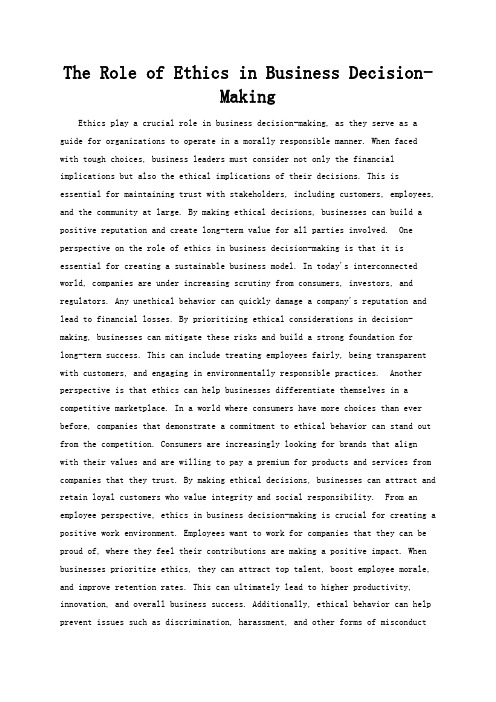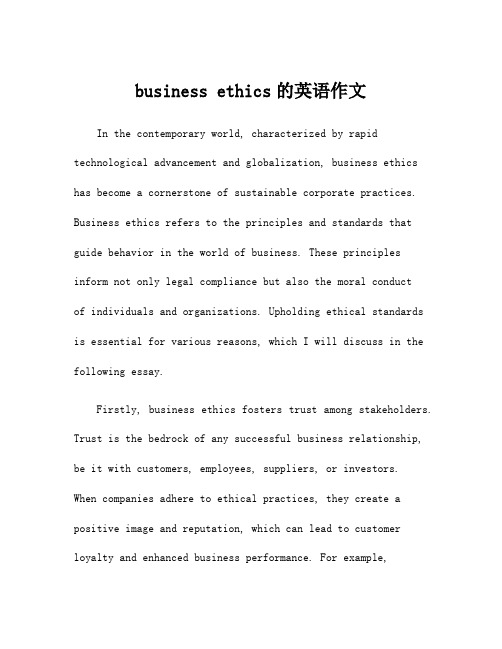Ethics in Corporate Financial Disclosure
The Role of Ethics in Business Education

The Role of Ethics in Business Education Ethics plays a crucial role in business education, shaping the future leaders of the corporate world. It is essential for business schools to incorporateethical principles into their curriculum to ensure that students are equipped with the necessary knowledge and skills to navigate the complex ethical challenges they will face in their careers. The integration of ethics in business education not only fosters a sense of responsibility and integrity in future business leadersbut also contributes to the overall ethical climate in the business world. From an academic perspective, the inclusion of ethics in business education provides students with a comprehensive understanding of the moral and ethical dimensions of decision-making in the corporate environment. By exposing students to ethical dilemmas and case studies, business schools can cultivate critical thinking and decision-making skills within an ethical framework. This approach enables students to develop a deeper appreciation for the ethical implications of their actions and empowers them to make principled decisions in their professional lives. Moreover, the incorporation of ethics in business education serves to bridge the gap between theoretical knowledge and practical application. By engaging students in discussions and activities that address real-world ethical challenges, business schools can prepare future business leaders to navigate ethical complexities in their careers. This experiential learning approach not only enhances students' ethical awareness but also equips them with the necessary tools to address ethical issues in a professional setting. Furthermore, the integration of ethics in business education contributes to the cultivation of a more ethical business environment. As graduates enter the workforce with a strong ethical foundation, they are better equipped to promote ethical conduct within their organizations. By emphasizing the importance of ethical leadership and decision-making, business schools can influence the ethical climate of the corporate world, ultimately fostering a culture of integrity and accountability. On the other hand, some critics argue that the focus on ethics in business education may detract from the development of other essential business skills. They contend that the emphasis on ethical principles may overshadow the importance of strategic thinking, financial acumen, and other core competencies necessary for success in the business world.However, this perspective overlooks the interconnectedness of ethics and business success. In reality, ethical conduct is not antithetical to business success but rather a fundamental component of sustainable and responsible business practices. In conclusion, the role of ethics in business education is paramount in shaping the future of business leadership. By integrating ethical principles into the curriculum, business schools can empower students to make principled decisions, bridge the gap between theory and practice, and contribute to a more ethical business environment. Ultimately, the inclusion of ethics in business education is not only a moral imperative but also a strategic investment in the development of ethical, responsible, and effective business leaders.。
商业伦理作文英语

商业伦理作文英语In the heart of the corporate world, ethical dilemmas often arise, challenging the moral compass of both individuals and organizations. The pursuit of profit can sometimes come into conflict with the principles of honesty, integrity, and fairness. This essay will delve into the complexities of business ethics, exploring the factors that contribute to ethical challenges and the importance of maintaining ethical standards in a competitive market.The Nature of Ethical DilemmasEthical dilemmas in business often stem from situations where the right course of action is not clear-cut. For instance, a company might face a decision to cut corners on safety regulations to meet a tight deadline, potentially jeopardizing worker safety but ensuring a lucrative contract. The dilemma here is between meeting financial goals and upholding the duty of care towards employees.Factors Influencing Ethical DecisionsSeveral factors influence the ethical decisions made within a business. These include:1. Corporate Culture: A company's culture sets the tone for ethical behavior. If a culture promotes transparency and accountability, it is more likely that employees will makeethical choices.2. Leadership: The behavior of leaders within an organization significantly impacts the ethical landscape. Leaders whomodel ethical behavior inspire others to follow suit.3. Regulations and Laws: External factors such as legal requirements and industry regulations play a crucial role in guiding ethical conduct.4. Personal Values: Individual values and beliefs also shape the ethical decisions made by employees.Consequences of Unethical BehaviorUnethical behavior can have severe repercussions for a business. These may include:1. Damage to Reputation: Once trust is lost, it ischallenging to regain. A company's reputation can be severely damaged by unethical practices.2. Legal Penalties: Violating laws and regulations can leadto hefty fines and legal action, which can cripple a business.3. Employee Morale: A workplace that lacks ethical integrity can lead to low morale and high turnover rates.Promoting Ethical ConductTo foster an ethical business environment, companies can:1. Establish a Code of Ethics: A clear and comprehensive code of ethics can guide employees in making ethical decisions.2. Provide Training: Regular training sessions on ethics can help employees understand the importance of ethical behavior and how to navigate ethical dilemmas.3. Encourage Open Communication: Creating an environment where employees feel comfortable reporting unethical behavior is crucial.4. Lead by Example: Leaders must embody the ethical standards they expect from their employees.ConclusionIn conclusion, business ethics is a critical component of corporate governance. It is not just about adhering to laws and regulations but also about upholding the moral principles that guide a company's actions. By promoting ethical conduct, businesses can build trust with stakeholders, maintain a positive reputation, and ensure long-term success. The challenge lies in balancing the pursuit of profit with the responsibility to act ethically, a balance that requires constant vigilance and commitment from all members of the organization.。
Business Ethics and Corporate Social Responsibility

LO 1
Ethics, Corporate Social Responsibility, and Corporate Sustainability (Cont.) Corporate sustainability focuses on the possible future impact of an organization on society, including social welfare, the economy, and the environment
2-6
LO 3
Sources of Ethical Guidance
Lead to our beliefs or convictions about what is right or wrong
Examples:
Bible and other holy books Conscience Significant others Code of ethics
2-5
LO 2
Explore the Concept of Business Ethics
Nearly every industry has experienced a painful ethical crisis in recent years Business ethics scandals continue to make headlines Examples: Lying on résumés Obstruction of justice Destruction of records Stock price manipulation Cutting corners to meet Wall Street’s expectations Fraud, waste, and abuse
The Role of Ethics in Business Decision-Making

The Role of Ethics in Business Decision-MakingEthics play a crucial role in business decision-making, as they serve as a guide for organizations to operate in a morally responsible manner. When faced with tough choices, business leaders must consider not only the financial implications but also the ethical implications of their decisions. This is essential for maintaining trust with stakeholders, including customers, employees, and the community at large. By making ethical decisions, businesses can build a positive reputation and create long-term value for all parties involved. One perspective on the role of ethics in business decision-making is that it is essential for creating a sustainable business model. In today's interconnected world, companies are under increasing scrutiny from consumers, investors, and regulators. Any unethical behavior can quickly damage a company's reputation and lead to financial losses. By prioritizing ethical considerations in decision-making, businesses can mitigate these risks and build a strong foundation forlong-term success. This can include treating employees fairly, being transparent with customers, and engaging in environmentally responsible practices. Another perspective is that ethics can help businesses differentiate themselves in a competitive marketplace. In a world where consumers have more choices than ever before, companies that demonstrate a commitment to ethical behavior can stand out from the competition. Consumers are increasingly looking for brands that align with their values and are willing to pay a premium for products and services from companies that they trust. By making ethical decisions, businesses can attract and retain loyal customers who value integrity and social responsibility. From an employee perspective, ethics in business decision-making is crucial for creating a positive work environment. Employees want to work for companies that they can be proud of, where they feel their contributions are making a positive impact. When businesses prioritize ethics, they can attract top talent, boost employee morale, and improve retention rates. This can ultimately lead to higher productivity, innovation, and overall business success. Additionally, ethical behavior can help prevent issues such as discrimination, harassment, and other forms of misconductin the workplace. On a broader scale, ethics in business decision-making can also have a positive impact on society as a whole. Businesses have a responsibility to consider the social, environmental, and economic impact of their actions. By operating ethically, companies can contribute to the greater good by supporting local communities, protecting the environment, and upholding human rights. Thiscan help build trust with the public and foster a more sustainable and equitable society. Ultimately, ethical business practices can lead to a more prosperous and harmonious world for everyone. However, it is important to acknowledge thatethical decision-making in business is not always easy. In some cases, there maybe conflicting interests between different stakeholders, making it challenging to determine the right course of action. Business leaders must navigate these complexities with integrity and transparency, seeking to balance the needs of all parties involved. This may require making difficult decisions that prioritizelong-term sustainability over short-term gains or standing up against unethical practices within the industry. In conclusion, ethics play a critical role in business decision-making, guiding companies to operate in a responsible and sustainable manner. By prioritizing ethical considerations, businesses can build trust with stakeholders, differentiate themselves in the marketplace, create a positive work environment, and contribute to the greater good of society. While ethical decision-making may present challenges, it is essential for businesses to uphold their values and principles in all aspects of their operations. By doing so, companies can not only achieve financial success but also make a meaningful impact on the world around them.。
The Ethics of AI in Banking and Finance

The Ethics of AI in Banking and Finance As artificial intelligence (AI) continues to advance in the banking and finance industry, the ethical implications of its use become increasingly important to consider. The integration of AI in finance has the potential to improve efficiency, reduce costs, and enhance customer experiences. However, it also raises concerns about privacy, bias, and accountability.One of the primary ethical concerns surrounding AI in finance is the issue of privacy. As AI systems collect and analyze vast amounts of personal data, there is a risk that this information could be misused or mishandled. Banks and financial institutions must ensure that they have robust data protection policies in place to safeguard against data breaches and cyberattacks. Additionally, customers must be informed about how their data is being used and given the option to opt-out if they so choose.Another ethical issue that arises with the use of AI in finance is the potential for bias. AI systems are only as unbiased as the data they are trained on, and if that data is biased, then the AI system will be biased as well. This could result in discriminatory lending practices or investment decisions that disproportionately benefit certain groups over others. To combat this, banks and financial institutions must ensure that their AI systems are trained on diverse data sets and regularly audited for bias.The accountability of AI in finance is also a significant ethical concern. As AI systems become more complex and autonomous, it becomes increasingly difficult to attribute responsibility for any negative outcomes that may arise. If an AI system makes a decision that results in financial loss or harm to a customer, who is responsible? Banks and financial institutions must establish clear lines of accountability for their AI systems and ensure that they are held responsible for any negative outcomes that may arise.Despite these ethical concerns, there are also potential benefits to the use of AI in finance. For example, AI systems can be used to automate routine tasks such as fraud detection and customer service, freeing up human employees to focus on more complex tasks. Additionally, AI systems can help identify patterns in financial data that may bedifficult for humans to detect, leading to more informed investment decisions and risk management strategies.In conclusion, the integration of AI in banking and finance raises important ethical concerns that must be addressed. Banks and financial institutions must ensure that they have robust data protection policies in place, train their AI systems on diverse data sets, and establish clear lines of accountability for their AI systems. While there are potential benefits to the use of AI in finance, it is essential that these ethical concerns are taken seriously to ensure that the benefits of AI are realized while minimizing the potential risks.。
公司金融英文版

Agency Problem Solutions
Takeovers Specialist Monitoring Legal and Regulatory Requirements
Role of the Financial Manager
Firm’s Operations
Real assets
(2)
(1)
Investors
Financial
Manager
(4a)
Financial
Assets
(3)
(4b)
1. Cash raised from investors (how?) 2. Cash invested in firm 3. Cash generated by operations 4A. Cash reinvested in the firm 4B. Cash returned to investors
Recent exampdoff
Agency Problem
Do managers really maximize value?
Agency Problems
• Managers are agents for stockholders, but the managers may act in their own interests rather than maximizing value
Corporations face the problem of double taxation Cash reinvested in the firm
The Financial Manager Benefits of the Corporation
lower managers The Financial Manager This chapter introduces the corporation, its goals, and the roles of financial managers. Bernard Madoff
business ethics的英语作文

business ethics的英语作文In the contemporary world, characterized by rapid technological advancement and globalization, business ethics has become a cornerstone of sustainable corporate practices. Business ethics refers to the principles and standards that guide behavior in the world of business. These principles inform not only legal compliance but also the moral conductof individuals and organizations. Upholding ethical standards is essential for various reasons, which I will discuss in the following essay.Firstly, business ethics fosters trust among stakeholders. Trust is the bedrock of any successful business relationship, be it with customers, employees, suppliers, or investors. When companies adhere to ethical practices, they create a positive image and reputation, which can lead to customer loyalty and enhanced business performance. For example,businesses that are transparent about their sourcing methods, labor practices, and environmental impacts are more likely to win customer trust, leading to higher sales and long-term sustainability. In contrast, companies engulfed in scandals or unethical practices may face public backlash, leading to decreased customer loyalty and potential financial ruin.Secondly, ethical business practices promote a positive workplace culture. Employees are more likely to be motivated, engaged, and productive when they work in an environment that prioritizes integrity and fairness. Companies that advocate for ethical behavior are often seen as more attractive employers, helping them attract and retain top talent. Furthermore, a strong ethical foundation can mitigate risks associated with workplace misconduct, such as fraud or harassment, thereby promoting a safer and more respectful work environment.Moreover, business ethics and corporate social responsibility (CSR) are interconnected. Businesses that prioritize ethical practices often find themselves more aligned with the principles of CSR, which involve acknowledging the impact of their operations on society and the environment. By integrating ethical considerations into their business strategies, organizations can contribute to social good while also enhancing their market position. For example, companies that invest in sustainable practices not only help to protect the environment but also appeal to a growing demographic of socially conscious consumers.In conclusion, the role of business ethics in today’s corporate environment cannot be overstated. Upholding ethical standards fosters trust among stakeholders, enhances workplace culture, and aligns businesses with the broader goals of social responsibility. As the business landscape continues to evolve, organizations committed to ethical practices will not only navigate challenges more effectivelybut also contribute positively to society and the economy at large. In essence, ethics in business is not merely a regulatory requirement; it is a vital component of long-term success and sustainability.。
公司理财(罗斯)第1章(英文

03 Valuation Basis
The concept and significance of valuation
要点一
Definition
Valuation is the process of estimating the worth of an asset or a company, typically through the use of financial metrics and analysis.
The Time Value of Money
